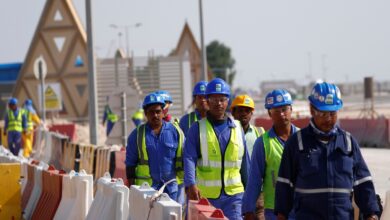Where is the Egyptian economy heading?!

Ahmed Mostafa
Ahmed Moustafa stated to Ruslan Suleymanov via Africa the Second Front the following:
“There are external problems affecting the internal economic situation in Egypt, especially the presence of 10 million refugees on Egyptian territory from surrounding countries.”
“Internally, the issue of economic advisors holding dual nationalities – increasing interest rates is unfortunately not considered – where is Parliament’s oversight role?”
“Among the proposed solutions is a sophisticated and logical community dialogue that addresses the minds of Egyptians, and respectful and thoughtful media treatment of economic projects, as well as inviting real experts to participate in formulating the Egyptian economic decision.”
One of the best programs in which I agree to appear from time to time is on the CBC Azerbaijan channel (Africa, the Second Front) with the young Russian journalist and friend, Mr. Ruslan Suleymanov.
Yesterday’s date was set for Wednesday, March 13, 2024, in an important episode about the Egyptian economy, after the recent developments that occurred during the past two weeks.
Indeed, at three o’clock in the afternoon yesterday, Cairo time, we recorded this important episode, but in a very calm manner consistent with the holy month.
The first question from the interviewer, Mr. Suleymanov, was – What are the most important challenges facing the Egyptian economy?
Several years ago, I answered this question in an important article that I published in three languages (Arabic, Russian, and English). In general, I began speaking with my sincere congratulations to the whole world on the occasion of the month of Ramadan, and may God bring it back with goodness to all people.
In the beginning, I spoke about the regional and external challenges, including all the regional disputes surrounding Egypt, and we do not know whether or not they intended to subjugate Egypt, starting with the brutal civil war in Sudan, which is divided against itself on Egypt’s southern borders – and the crisis in Libya and the existence of two regimes and two governments there on Egypt’s western borders. – As well as the Renaissance Dam crisis, Ethiopia’s lack of commitment to regional and international resolutions and agreements, and the attempt to impose a fait accompli on the Renaissance Dam – and of course what is happening in Gaza on our northeastern borders – in addition to the presence of many refugees from Arab and African countries, according to the official statistics of the National Council for Human Rights, amounting to about (10 million refugees), and this, in turn, puts great pressure on the economy.
The second question – Have the recent events in Gaza, as well as what is happening in the Red Sea some negative impacts on the economic situation in Egypt?
I asked the interviewer to complete the point that we started in the previous question, which concerns internal challenges, and it is also linked, as you can see, to this question which concerns regional challenges and their economic impacts. Among the most important internal challenges, because we do not absolve ourselves of negligence – the confusion in economic policies – the rampant interest rate hike, and many national experts objected to this rampant hike – the floating of the Egyptian pound linked to businessmen, experts, and economic advisors, who unfortunately hold other nationalities with foreign agendas, etc. They only care about getting commissions and implementing their agendas.
Complying with the conditions of the International Monetary Fund and the World Bank, with whom we have had bad experiences since the 1970s – even some ministers have shaky hands and are not fit for the ministry, and others are afraid of making any decisions for which they may be blamed in the future – the high inflation rate is not the responsibility of the Egyptian economy, which is more than 100%, but failed economic decisions, and the interest rate can only be increased in the case of a strong, revitalized economy, with huge purchasing power, in which the demand for consumer goods and luxury increases. Accordingly, the interest rate is raised to correct this imbalance so that the demand for saving and thus investment increases, and thus a balance occurs in the market and the economy again.
Regarding the issue of the Red Sea and the Houthis – there is no Egyptian dispute with the Houthi group. Rather, Egypt has supported the Houthis since 2018, especially after a war against him that lasted for 8 years. We know that the Houthis are carrying out their operations on behalf of the Arab and Islamic world because of what is happening in Palestine, especially Gaza and that the war on American, British, and Israeli ships and vessels will stop if the war on our brothers in Palestine stops – but other ships pass without the slightest exposure to them until we understand the picture. The statements of Abdul-Malik al-Houthi and those on his behalf confirm that there are more than (4,000 ships) that have passed through the Red Sea since the attacks on enemy ships began in Bab al-Mandab.
The third and final question revolved around the measures taken by the Egyptian government to resolve the crisis in the economic situation in Egypt, and whether international financial institutions can contribute to solving the problem?
I began the answer with a joke that these are the first things you should ask the President or the Prime Minister. From my limited point of view, the poor media coverage of some economic proposals has caused many problems, and therefore these proposals must be logical and respect the minds of national experts. Even in the National Economic Dialogue last year, the president mocked the same group of advisors and ministers, telling them verbatim, “Any student in the college of economics or commerce could give me the same propositions that you put forward to me.”
What is needed is media that raises economic awareness, and a respectful and logical societal dialogue that addresses the minds of Egyptians with logic on sensitive economic issues, because the poverty rate currently may exceed 40% or more with inflation increasing by 100%. Even though the Prime Minister promised to set the factory price on goods and products last January, this has not been implemented, and there is manipulation by the Chambers of Commerce and the Supply Commodities Authority.
Even concerning the energy issue, before the month of Ramadan, the power outage had been ongoing since last July without a solution, in a country where the sunshine rate exceeds 90% throughout the year, and you, Mr. Ruslan, have lived in Egypt and know this yourself. We were supposed to have large energy surpluses, not the other way around. The idea is that economic advisors and ministers must be competent and selected according to private sector standards, with a high sense of patriotism. Just as President Putin made constitutional amendments in 2020 while the West was unaware, he also chose national ministers who would preserve the country’s sovereignty and social security. Also, there are businessmen in Parliament who have dual nationality or control important strategic goods, and this has a kind of conflict of interest. These things are currently what calm the Egyptian citizens.
In the end, I would like to thank you, Dr. Ahmed, for this important dialogue, and I wish you and the honorable Egyptian people success and prosperity.
I would like to add something Ruslan, that Egypt is not a poor country, and that Egypt’s youth are an added value, through Startups and small and medium enterprises they have achieved a value of 7 billion dollars, and therefore we want many of such projects and greater attention to youth, and happy new year.




